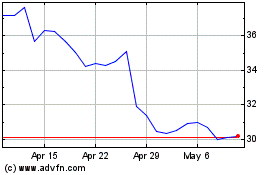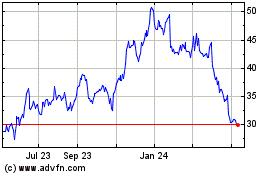Intel Shares Down After 7nm Chip Delay; Taiwan Semiconductor ADRs Up
July 24 2020 - 11:40AM
Dow Jones News
By Michael Dabaie
Intel Corp. shares were down 14% to $51.90 in late morning
trading.
After the market close Thursday, the company reported
second-quarter revenue of $19.7 billion, up from $16.5 billion and
above FactSet consensus for $18.5 billion. Adjusted EPS was $1.23,
beating FactSet consensus for $1.11.
The company said it shifted its seven-nanometer-based CPU
product timing about six months relative to prior expectations. The
primary driver is the yield of Intel's 7nm process, which is now
trending about 12 months behind the company's internal target.
"We have identified a defect mode in our 7-nanometer process
that resulted in yield degradation. We've root caused the issue and
believe there are no fundamental roadblocks, but we have also
invested in contingency plans to hedge against further schedule
uncertainty," Chief Executive Robert Swan said in the company's
conference call.
"Based on management's commentary and tone on the call, and the
facts indicated by the stated timeline, we think a move to
outsource to [Taiwan Semiconductor Manufacturing Co. Ltd] is all
but inevitable," Raymond James said in an analyst note.
SunTrust Robinson Humphrey said in a note that it believes TSMC
would be the likely beneficiary of Intel's potentially expanding
use of foundry partners "owing to TSMC's leading manufacturing
capabilities."
Taiwan Semiconductor ADRs were up 11% to $75.08 in morning
trading.
"INTC's manufacturing struggles create opportunities for TSMC
whether from competitors taking share or INTC outsourcing product,"
Wedbush said in an analyst note.
"By outsourcing leading edge technology, presumably to TSMC,
INTC would give up what has been its main source of competitive
advantage for 50 years and compete only on architecture, which we
don't think is enough to maintain the dominant market share and
premium margins that are now expected," Raymond James said in its
note.
J.P. Morgan said that although the announced delay in Intel's
7nm process was a disappointment, it believes the executive team
has made a strategic decision that it will no longer hold back its
product leadership, roadmaps and new product introductions on
manufacturing delays and that it already has a strong contingency
plan in place to move to an outsourced manufacturing model.
Oppenheimer said it sees Intel's manufacturing mix "increasingly
favoring external supply over time as a solution to INTC's
bleeding/leading edge production struggles as well as an affective
buffer against rising capital intensity."
Write to Michael Dabaie at michael.dabaie@wsj.com
(END) Dow Jones Newswires
July 24, 2020 11:25 ET (15:25 GMT)
Copyright (c) 2020 Dow Jones & Company, Inc.
Intel (NASDAQ:INTC)
Historical Stock Chart
From Mar 2024 to Apr 2024

Intel (NASDAQ:INTC)
Historical Stock Chart
From Apr 2023 to Apr 2024
